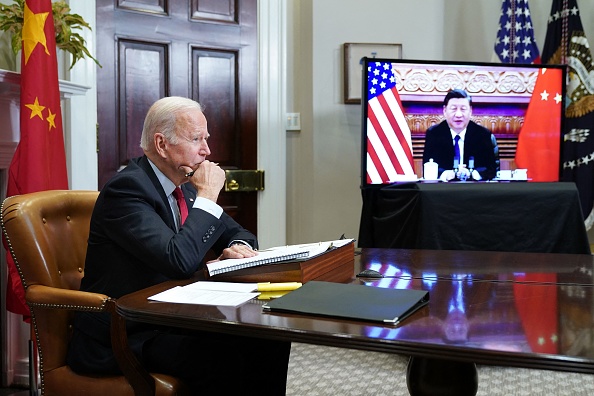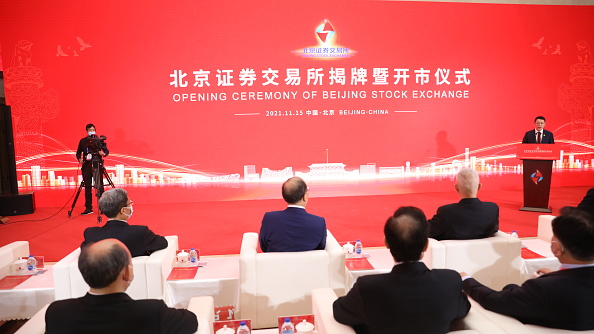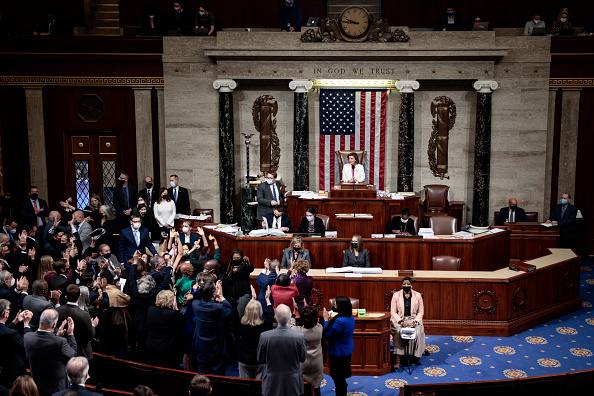
 Responsible World Leadership
Responsible World LeadershipPresident Biden and Chinese leader Xi Jinping held a virtual summit Monday night in an effort to lower tensions that have eroded trust and raised the possibility of conflict between the world's top two economies.
"None of this is a favor to either of our countries . . . it's just responsible world leadership," Biden told Xi in his opening remarks. The Chinese President told Biden that the two sides needed to "manage differences and sensitive issues in a constructive way to prevent Sino-U.S. relations from derailing," according to Xinhua.
Despite few concrete breakthroughs on key issues such as climate, trade, the pandemic, or arms control, the two leaders did establish a dialogue that can become more constructive, potentially easing tensions. And following the meeting, the U.S. and China also agreed to ease travel and visa restrictions on each others' journalists, which will allow journalists to enter and depart from both countries more freely. Both countries also pledged to resume issuing new journalist visas, a process largely halted since early 2020.
Xi Jinping also used the virtual summit with U.S. counterpart Joe Biden to warn that encouraging Taiwanese independence would be "playing with fire." Taiwan has recently evolved into a flashpoint as China increasingly flies fighter jets and bombers into its air defense identification zone, and the U.S. seemingly continues to reaffirm its commitment to supporting the island.
Read more in "Chinese, U.S. Leaders Against 'New Cold War'," by Zhao Minghao, a Research Fellow at the Charhar Institute.
 Circuit Breakers
Circuit BreakersThe Beijing Stock Exchange officially launched and opened for trading on Monday with high hopes from Chinese leaders for its domestic economic impact. Trading on the new exchange rallied on its first day, when the first batch of 81 firms started trading, including 10 initial public offerings from tech and manufacturing companies. The new Chinese bourse surged as much as six-fold and triggered circuit breakers, before closing with an average price increase of 200%.
Chinese leaders have been championing the new bourse as a way to drive funding for small and medium-sized enterprises. The exchange will "facilitate innovation-driven development and economic upgrading and transformation," according to Yi Huiman, chairman of the China Securities Regulatory Commission, speaking at an opening ceremony.
The exchange will also provide welcome relief for companies who have been subject to greater scrutiny by U.S. and Chinese authorities when trying to list on the U.S.stock exchanges, or whose shares already trade in U.S. markets.
 Congressional Action
Congressional ActionA series of U.S. Congressional actions relating to China have transpired over the last week, including a commission of experts convened by Congress to present the U.S.-China Economic and Security Review's annual report. The panel recommended the U.S. pursue more assertive steps to tone down commercial ties with China due to national security concerns, urging restrictions on U.S. investment in China and on investors' ability to purchase U.S.-listed Chinese stocks. The panel said that the "economic interdependency" is of particular concern now because of Chinese President Xi Jinping's moves to gain authority over China's corporate sector, which can blur the lines between private Chinese companies and those that are run by the state.
President Biden's bipartisan infrastructure bill was also signed into law on Monday, a major piece in the administration's economic agenda that will pour over $1 trillion into U.S. transit and broadband internet. President Biden and top U.S. officials have continued to emphasize that the bill will do more than just rebuild infrastructure, but will play a significant role in increasing U.S. competitiveness with China in an effort to control the 21st century economy. "Because of this law, next year will be the first year in 20 years that American infrastructure investment will grow faster than China's," Biden said. Another official noted that while the law is an important step, it's not a huge move forward compared to the infrastructure progress China has made.
Meanwhile, on Monday, Senate Democratic Majority Leader Chuck Schumer announced that the National Defense Authorization Act would be amended to include the U.S. Innovation and Competition Act, following months of supporters working to find a way to pass the bill and send it to President Biden to sign into law. The measure would allot billions of dollars to strengthen U.S. technology and research and is another move touted to boost competitiveness with China. The standalone bill had stalled in the House of Representatives after being overwhelmingly passed by the Senate in June. The NDAA often serves as a vehicle for various policy issues as it is one of the few major legislation pieces passed annually.
Prepared by China-US Focus editorial teams in Hong Kong and New York, this weekly newsletter offers you snap shots of latest trends and developments emerging from China every week, while adding a dose of historical perspective.
- 2021-11-12 A Historic Transformation
- 2021-11-05 A Green Rivalry
- 2021-10-29 Dry Tinder
- 2021-10-22 A Diplomatic Burn
- 2021-10-15 Energy Crunch
- 2021-10-08 Stoking Tensions
- 2021-10-01 Great Power Coopetition
- 2021-09-24 Sign of Goodwill?
- 2021-09-17 State of Play
- 2021-09-10 The Last Word
- 2021-09-03 Heightened Frustrations
- 2021-08-27 China’s Backyard
- 2021-08-20 Graveyard of Empires
- 2021-08-13 A New Crossroads
- 2021-08-06 Lowering Barriers
- 2021-07-30 A Diplomatic Stalemate
- 2021-07-23 A Climate for Change
- 2021-07-16 The Trade Game
- 2021-07-09 Existential Threats
- 2021-07-01 Centenary Celebrations
